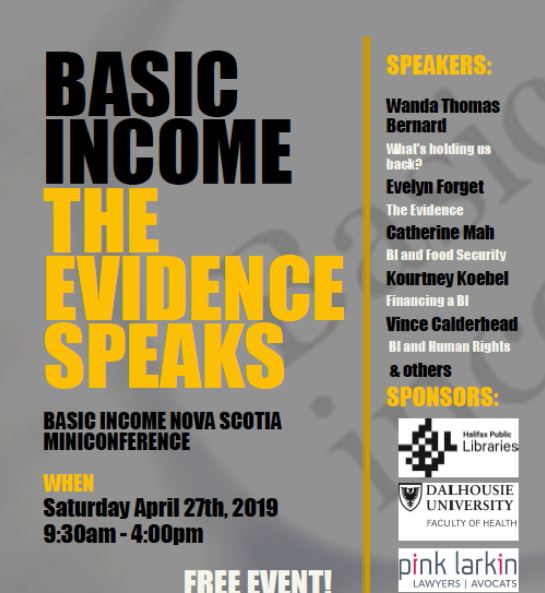Advocates of a national basic income plan are calling on the provincial and federal governments to adopt a Canadian basic income guarantee program and say the “evidence speaks” for itself.

Basic Income Nova Scotia is hosting a mini-conference Saturday at the Halifax Central Library from 9:30 a.m. to 4 p.m., and will bring experts from a range of backgrounds, from health and economics to those who live in poverty, in order to make the case for a universal basic income program and show how it can be implemented in Nova Scotia.
“We have to address poverty differently,” said Basic Income Nova Scotia Chair and Dalhousie professor Elizabeth Kay-Raining Bird.
“The current system of income assistance is just not working. It doesn’t raise people out of poverty.”
Prior to April 1, the minimum wage in Nova Scotia was the lowest in Canada. Now bumped up to $11.55 an hour, it’s still only better than the $11.40 in Newfoundland and Labrador and $11.50 in New Brunswick – which advocates say is not enough to live on.
“Around 23 per cent of Nova Scotians are living in poverty and that rate can go up (in rural areas) like Yarmouth, where that number can reach as high as 40 per cent,” said Kay-Raining Bird.
The conference will feature a list of speakers including Senator Wanda Thomas Bernard, a social worker and professor at Dalhousie University who will address the issues that are holding basic income back from becoming policy here in Canada, while Evelyn Forget who has studied the impacts of basic incomes on Canadian populations and beyond, has just published the book The Town With No Poverty, a study of the basic income experiment in Manitoba from 1974-1979.
Advocates suggest there are many studies that show the labour market and traditional industrial and factory jobs are no longer the backbone of local economies, technology has a hand in changing that.
Today, as Kay-Raining Bird points out, many people are finding themselves in precarious job situations where they are working multiple jobs, but still struggle to make ends meet. Basic income, she said, will help fill that gap and ensure people can fulfill their basic needs.
Food insecurity is a topic closely associated with poverty, and the affordability of healthy food for some is out of reach and creating a health crisis for the working poor, said Dr. Catherine Mah, the Canadian Research Chair in Promoting Healthy Populations.
Dr. Mah says this has serious short and long-term heal effects on people and the greater population.
“Being food insecure actually results in poor diet quality, poorer nutritional status, poorer physical and well and poorer mental health.,” said Dr. Mah. “Basic income is really an interesting and potentially effective policy opportunity to reduce the severity as well as the potential health effects of food insecurity in Canada.”
Basic Income Nova Scotia will continue to advocate for the implementation of universal basic income and say the pilot projects completed in Winnipeg, and even the most recent pilot project cut short in Ontario have all shown it’s a successful model.
“We are seeking to bring all parties and all levels of government together and to have a discussion and create what we hope to be a road map to implement basic income to Nova Scotia.”
The conference is free and takes place on Saturday at the Halifax Central Library. For more information visit the events page.




Comments